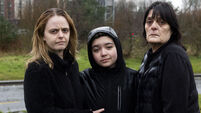Irish lay the foundations for success
Denied the services of key personnel in Paul O’Connell and Brian O’ Driscoll, the team faltered in their absence, and it was disappointing at the time that none of the other experienced hands emerged from the ranks to fill the leadership void.
In the circumstances, new caps Andrew Tremble, Jerry Flannery and Rory Best had a tough introduction to the international scene but displayed sufficient promise to warrant further inclusion.















